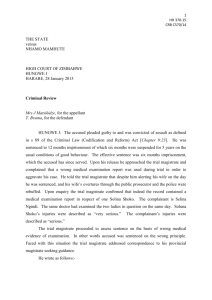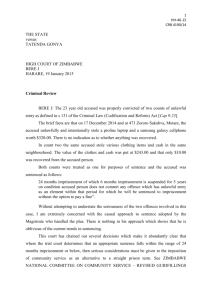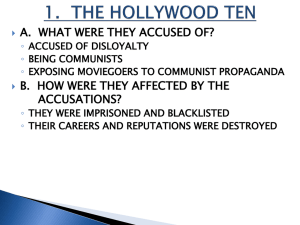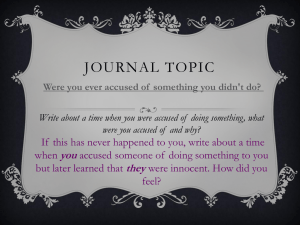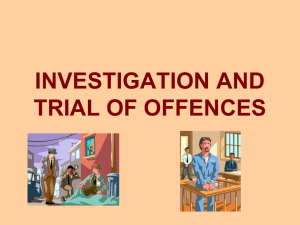hc-criminal-division-2015-15
advertisement
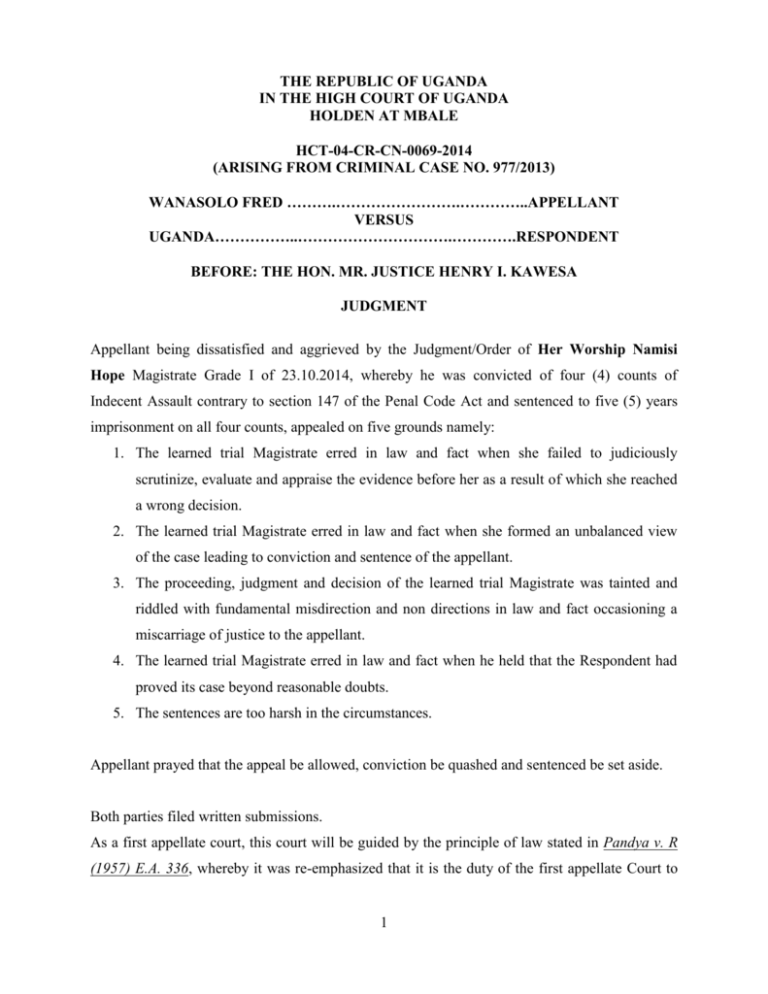
THE REPUBLIC OF UGANDA IN THE HIGH COURT OF UGANDA HOLDEN AT MBALE HCT-04-CR-CN-0069-2014 (ARISING FROM CRIMINAL CASE NO. 977/2013) WANASOLO FRED ……….…………………….…………..APPELLANT VERSUS UGANDA……………..………………………….………….RESPONDENT BEFORE: THE HON. MR. JUSTICE HENRY I. KAWESA JUDGMENT Appellant being dissatisfied and aggrieved by the Judgment/Order of Her Worship Namisi Hope Magistrate Grade I of 23.10.2014, whereby he was convicted of four (4) counts of Indecent Assault contrary to section 147 of the Penal Code Act and sentenced to five (5) years imprisonment on all four counts, appealed on five grounds namely: 1. The learned trial Magistrate erred in law and fact when she failed to judiciously scrutinize, evaluate and appraise the evidence before her as a result of which she reached a wrong decision. 2. The learned trial Magistrate erred in law and fact when she formed an unbalanced view of the case leading to conviction and sentence of the appellant. 3. The proceeding, judgment and decision of the learned trial Magistrate was tainted and riddled with fundamental misdirection and non directions in law and fact occasioning a miscarriage of justice to the appellant. 4. The learned trial Magistrate erred in law and fact when he held that the Respondent had proved its case beyond reasonable doubts. 5. The sentences are too harsh in the circumstances. Appellant prayed that the appeal be allowed, conviction be quashed and sentenced be set aside. Both parties filed written submissions. As a first appellate court, this court will be guided by the principle of law stated in Pandya v. R (1957) E.A. 336, whereby it was re-emphasized that it is the duty of the first appellate Court to 1 review the evidence with a fresh scrutiny and come up with its own conclusion bearing in mind that it did not have the benefit of listening to the witnesses and take note of their demeanour. From the lower court record the prosecution led evidence through PW.1 Anywar David Otto, who stated that accused was a former librarian at their school and that on one occasion he called him in the library and told him to remove his short then put his penis in his anus and sodomized him. He never told anybody of his ordeal, save his parents after the accused was arrested. He was taken to hospital and was examined. PW.2 Oduya Paul Brian said accused held one of his hands forcefully and touched his pubic area. He told his friend Faith and his Aunt Nabukenya Cissy. He touched him forcefully around his pubic area a second time but the witness feared to inform anybody. PW.3 Nabukenya Cissy said on 25.10.2013 his son tried to have sex with his elder sister Nakitende Nancy. On being quizzed he said accused was preparing him for homosexuality. She reported to police. PW.4 Masuba Hakim also informed court that accused used to touch armpits and private parts of pupils and that he also touched his penis and told him to kiss him. PW.5 Kauta Simon 14 said one day, the accused also touched his penis and told him that when he starts his heat period sperms will start coming. PW.6 Walufu Makuya, said one time accused touched his penis and he told madam Nabugere. PW.7 Rubanza Barnabas examined Paul Brian and found he was in good health and found a scar which he suspected he could have sustained during sodomy. PW.8 Wamboga David was the Investigating officer. 2 In defence the record indicates that DW.1 Wanasolo Fred told court that his co-worker Mukwana was not happy when he earned extra allowances. He maliced him and his allowances were withdrawn in June 2011. He thought it was Mukwana who caused a frame up and that was how the case came up. The record then indicates that it was adjourned after the accused indicated that he wanted to call witness. It was adjourned to 07.07.2014 for further defence hearing. The record shows that on 07.07.2014, court sat and noted thus; “case for further defence hearing.” Accused brought two witnesses, Lulakala Lawrence and Rev. Canon Edward Mutobokho who came to testify about the accused’s life and character, but court considered this evidence unnecessary and did not take their evidence. The accused then indicated he would call another witness from school, but he failed. On 04.08.2014 he closed his case. It was from that evidence that the learned trial Magistrate in her judgment found the accused liable on counts 1, 2, 3, and 5 and not liable on count 4. From the assessment of the lower court record as above, reading of the memorandum of appeal, and arguments raised in submission by both appellant; counsel and defence, I will first determine ground No.3, which in my view will dispose off the entire appeal. Ground 3: “The proceedings, judgment and decision of the learned trial Magistrate was tainted and riddled with fundamental misdirection and nondirections in law and fact as a result of which a miscarriage of justice has been occasioned to the appellant.” In arguing this ground, the appellant stated that, there were gross misdirections committed by the learned trial Magistrate while assessing the evidence. There is prima facie evidence that the learned trial Magistrate erred in disregarding the appellants vital evidence and in failing to accord the appellants a fair trial. We submit that her findings occasioned a miscarriage of justice to the appellant whose right to liberty is being violated. 3 Furthermore in his submissions in rejoinder, counsel alluded to the need for a judgment of court to be rooted in confidence as per Metropolitan Properties Fas Ltd v. Lannon (1969) 571, and Local Ball (UK) Ltd vs. Bayfield Properties Ltd and Anor (2000) QB. In answer to this ground the learned State Attorney for defence argued that the court correctly evaluated the evidence and accorded accused a fair trial. She asserts at page 3, “ from the extract it seems to us that the lower court made a preliminary examination of the content of the two witnesses’ evidence and arrived at the conclusion that it was unnecessary to the issues at hand…….” At page 4, she concludes; “Basing on the above we submit that counsel has not shown any gross misdirections committed by the trial court….” The starting point for this court is to examine whether the accused person was accorded a fair trial, whether the learned trial Magistrate followed the right procedure in denying accused to call the two witnesses Lulakala Lawrence and Rev. Canon Edward Mutobokho; and lastly whether the learned trial Magistrate’s judgment exhibits an unbalanced view of the case, whereby he wrongly convicted the appellant. I resolve the above questions as follows: (i) Whether accused was accorded a fair trial. In my reading of the proceedings there were glaring procedural irregularities committed by the trial court, which affected the quality of Justice. According to section 128 of the Magistrates Court Act, the procedure is that; “At the close of the evidence in support of the charge, if it appears to the court that a case is made out against the accused person sufficiently to require him to make a defence, the court shall again explain the substance of the charge to the accused, and shall inform him that he has the right to give evidence on oath from the witness box and that, if he does so, he will be liable to cross examination or to make a statement not on oath from the dock and shall ask the accused whether he or she has any witnesses to 4 examine or other evidence to adduce in his defence, and the court shall then hear the accused persons and then hear all their witnesses.” From the above provision, the record in the lower court indicates that the accused indicated that he would give sworn evidence and call two witnesses. When the accused brought his two witnesses 07.07.2014, the record shows that court did not take down their evidence the record shows; “Accused brought two witnesses, Lulakala Lawrence, and Rev. Canon Edward Mutobokho who came to testify about accused’s life and character but court considered this evidence unnecessary and so did not take their evidence.” This was contrary to section 128 Magistrate’s Court Act above. It clearly amounted to denial of the accused of his constitutional right to defend himself. Secondly it was irregular at this stage for court to pronounce itself on the relevancy of the witnesses since they were not court witnesses but defence witnesses. How did the learned trial Magistrate know in advance what they were going to say? Counsel for respondent argues that court held preliminary hearings but that is not anywhere on record. Even if it did, that procedure is unknown in criminal trials. Section 136 (1) of the Magistrates Courts Act- refers This was a very fatal irregularity which this court cannot overlook. Assessment of evidence is done as a whole after hearing all the evidence available. The Magistrates Courts Act, section 138 provides for the mode of recording evidence from witnesses. The evidence must be taken down in writing and shall form part of the record. This provision was abused, by the learned trial Magistrate. In this, the accused was not subjected to a fair trial since accused was condemned without hearing his witnesses. 5 I therefore I agree with the arguments by appellants that the above rejection of accused’s evidence, offends accused’s right to a fair trial provided for under Article 28 (3) (c) and (g) of the 1995 Constitution. This leads me to the next complaint that the learned trial Magistrate’s assessment of evidence and the judgment depicts an unbalanced view of the case and hence she wrongly convicted the appellant. Appellant’s counsel while arguing ground 2, made reference to the framed manner of assessing evidence by the learned trial Magistrate where she analyzed the case and before evaluating all the evidence at pages 2 and 3 of her judgment and concluded that “accused put up a denial.” Without evaluating appellant’s evidence and refusing to attach any evidential value to his line of defence. Defence State Attorney argued that the learned trial Magistrate did not violate Article 28 (3) (c) and (9) of the Constitution of the Republic of Uganda, because the evidence by accused that he was framed up was an afterthought, and hence court was right to reject the accused’s witnesses. She proposed that the court had utilized a preliminary examination of the said witnesses. She proposed that it’s not that accused was convicted before evaluating his defence but just because his evidence was of no evidential value. I have already faulted the learned trial Magistrate’s misdirection in handling accused’s evidence. In assessment of evidence the learned trial Magistrate also showed bias in that she concluded that accused’s evidence is of no value before evaluating it. As pointed out in Twehangaine Alfred v. Uganda Criminal Appeal No. 139/2001, the court held that the learned trial Judge erred when he rejected the appellant’s sworn evidence which clearly pointed out that the offence was planted against him as pointed out especially by the contradictions in the testimonies of the prosecution witnesses. Reading the learned trial Magistrate’s judgment it is clear that the learned trial Magistrate had made up her mind before assessing the defence. At page 2 she evaluated only the evidence as 6 adduced by the prosecution. She then divulges into defining the key ingredient of indescent assault. At page 3 she concludes; “The accused put up a denial but I believe the evidence of PW.4 and PW.5 as time and not shaken in cross examination.” This is after the record indicating that accused had testified and had called 2 witnesses whom she rejected. Nowhere in her judgment is this evidence evaluated or reviewed. The judgment does not explain why the learned trial Magistrate believed the defence to be a denial yet accused put up a defence of a frame up. This type of judgment offends the known principles of writing judgment which are enumerated in section 136 (1) of the MCA, which provides that: “Every judgment shall contain the point or points for determination, the decision thereon and the reason for the decision and shall be signed and dated by the Magistrate on the date on which its pronounced in open court.” This is the spirit behind the cases of Metropolitan Properties Ltd v. Lannon (1969) 571, that judgment must be rooted in confidence and confidence is destroyed when right minded people go away thinking the Judge was biased. The learned trial Magistrate’s judgment gives the impression that she was biased. Also in Localball (UK) Ltd v Bay Field Properties Ltd and Another 2000 QB; “Any Judge who allows any judicial decision to be influenced by partiality or prejudice deprived the litigant of the important right to which we have referred and violates one of the most fundamental principles underlaying the administration of justice wherein any particular case the existence of such partiality or prejudice its actually shown the litigant has irrestible grounds for objecting to trial of the case by that Judge or for applying to set aside the judgment.” It’s my view that the learned trial Magistrate’s judgment falls within the above description. The entire record and judgment of the lower court shows for sure that the learned trial Magistrate proceeded irregularly in the process of hearing and in the review of evidence, and judgment. She 7 therefore did not accord the accused a fair trial, and her decision and sentence amounted to a miscarriage of justice. I find that ground 3 of this appeal has been proved. The findings under ground 3, also dispose of grounds 1, 2, 4 and 5 of this appeal in that; 1. The learned trial Magistrate erred in law and fact when she failed to judiciously scrutinize, evaluate and appraise the evidence. 2. She formed an unbalanced view of the case leading to conviction and sentence of appellant. 3. She erred in law and fact when she held that Respondent had proved its case beyond reasonable doubts. 4. The sentences are too harsh in the circumstances. I accordingly uphold this appeal. The judgment is set aside, the conviction is quashed and sentence is accordingly set aside. The accused is hereby set free forthwith; and I order his immediate release unless there are other lawful charges against him. I so order. Right of appeal explained. Henry I. Kawesa JUDGE 19.10.2015 8




